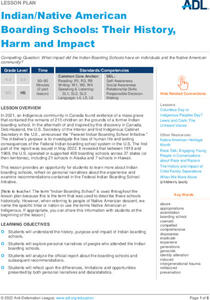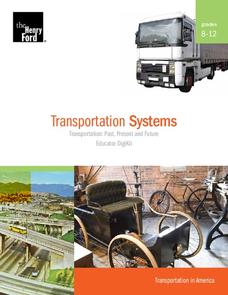Curated OER
The Economienda System
Explore the Economienda System common in Latin America during the 1700s. The class will read the included text, answer 3 critical-thinking questions, and fill out a pie chart showing the demographics of the time. They will learn about...
Anti-Defamation League
Impact of the U.S. Expansion on Indigenous People and Stereotypes About Native American People
The 2004 U.S. bicentennial sparks a discussion about its meaning and importance to United States history. Readings, maps, tables, and reflective writing prompt small groups to explore the westward expansion, Lewis and Clark, and how...
Curated OER
Native American Literature
Introduce your class to the writing of the indigenous Americans and, even more well known, their story telling. An engaging presentation describes what kinds of texts would be included in the oral stories performed and some common themes...
Oklahoma Bar Association
Into Which Caste Have You Been Cast?: India's Caste System
What was it like to fit into a certain class with no choice in the matter? Learners experience the caste system in a role-play activity, work individually on handouts to enhance their learning, and participate in an evaluation activity...
American Institute of Physics
African Americans in Astronomy and Astrophysics
A two-part lesson focuses on the contributions to the fields of astronomy and astrophysics of two African Americans: Benjamin Banneker and Dr. George Carruthers. In part one, scholars learn about Benjamin Banneker by examining his...
Curated OER
Writing Exercises: Latin American Independence
Budding historical analysts take to describing the road to Latin American independence. They'll respond to three writing prompts which require them to describe or analyze specific events in Latin American history.
Curated OER
Modern Interpretations
To conclude an eight-lesson study of the events that occurred in the early colonial period in Deerfield, Massachussetss, class members evaluate the point of view and bias found in late 19th and early 20th century retellings.
Curated OER
Focus of Native American Religious Practices
Here are five quick lessons you can use to introduce your class to religions from around the world. They view and perform a Native American dance, watch a video on Judaism, compare the difference between Catholics and Protestants, watch...
Curated OER
What is the Federal System Created by the Constitution?
Explore the unique structure of the federal system of government in the United States. Class members will learn about how most nations were organized before the establishment of the Constitution, how power is currently divided between...
Anti-Defamation League
Indian/Native American Boarding Schools: Their History, Harm and Impact
Encultureate, assimilate, or eliminate? The 2021 discovery of a mass grave of over 200 children on the site of a former Canadian Indian Boarding school led to the creation of the Federal Indian Boarding School Initiative. High schoolers...
Henry Ford Museum
Transportation Systems
Learners analyze the evolution of cultural attitudes through the lens of transportation, examining several artifacts, documents, and photographs. Topics covered include how American attitudes have influenced society's evolution into a...
Curated OER
The American Currency Exhibit
Examine the historical structure, the purposes, and functions of the United States monetary system. Your class engages in a scavenger hunt to compare U.S. currency notes from specific eras throughout U.S. history. They work to identify...
K12 Reader
The Metric System
How did the metric system come to be, and why does the US not use it very much? Your class can learn the answers to these questions with the reading passage included here and then respond to the five related questions.
American Institute of Physics
The Black Scientific Renaissance of the 1970s-90s: African American Scientists at Bell Laboratories
A two-part lesson asks young scientists to research the contributions of African American scientists at Bell Laboratories. After presenting their findings, class members watch two demonstrations that introduce them to total internal...
Federal Reserve Bank
Financial Crises, Reform, and Central Banking: Establishing the Federal Reserve
From the First and Second Banks of the United States to the founding of the Federal Reserve, discover how the American nation attempted to reform its financial history throughout the years.
Sign Writing
American Sign Language Hand Symbols
Whether you are learning or teaching American Sign Language, a thorough resource on the ways to depict different hand symbols is sure to enhance your journey into proficiency. With sections on different hand symbol groups, including...
Alabama Department of Archives and History
An African American Represents Alabama during Reconstruction
The era after the Civil War saw a flourishing of African Americans exercising their rights. Using graphic organizers and Internet research, pupils consider the legacy of Benjamin Sterling Turner, who sat in Congress. Afterward, they...
Curriculum Corner
African American Inventors
Celebrate Black History Month with a packet of materials on African American inventors. Readers discover several inventors' character traits, their inventions, and their lives. They even have the opportunity to conduct further research...
Curated OER
Native Americans of the Chesapeake Bay: Using Primary vs. Secondary Sources
Discover the rich Native American culture that existed at the time of early European exploration into the Chesapeake region through analysis of several primary and secondary sources.
Constitutional Rights Foundation
Winner-Take-All: The Two-Party System
Two's company, three's a crowd. High school historians learn about the Electoral College, a two-party, winner-take-all voting system in the United States. The lesson explains the pros and cons of the two-party system, roadblocks for...
Curated OER
Impact of Native Americans
Scholars discover the contributions Native Americans have given the world. Pupils examine materials and discuss their importance, including American Sign Language. A worksheet carefully organizes examples; groups jigsaw a reading passage...
C3 Teachers
Black Genius: How Did Black Genius Help Build American Democracy?
"How did the slavery system undermine the United States' democratic principles?" This question launches a study of how the Preamble to the Declaration of Independence, Article I, Section 2 of the U.S. Constitution, and Article IV,...
National Woman's History Museum
African American Activists
Ida B. Wells, Rosa Parks, and Fannie Lour Hammer are three African American activists who stood up for change. Though living in different time periods, all three women sought justice and equality. Class members examine primary source...
Curated OER
Narrative of the Life of Frederick Douglass an American Slave, Written by Himself
The narrative works of Frederick Douglass engage learners in the topic of slavery. They will experience American history in a new way, a Douglass expresses his thoughts in his own words. Pupils then interpret this literary work.

























